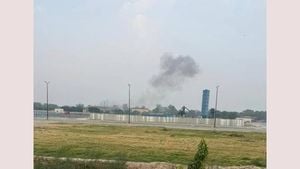A Louisiana grand jury has indicted Dr. Margaret Carpenter, a New York physician, for allegedly enabling the termination of pregnancy by prescribing abortion pills to a minor. This unprecedented case marks the first criminal charges against an abortion provider following the overturn of Roe v. Wade, and highlights the growing tensions between state laws post-abortion rights reversal.
The indictment was issued on January 31, 2025, against Carpenter and the minor’s mother, whose identity has not been publicly disclosed to protect the child. They are both charged with felony criminal abortion by means of abortion-inducing drugs.
District Attorney Tony Clayton stated, "This case is centered around coercion. The minor did not want the abortion, and we believe this is about forcing someone to undergo a procedure they did not consent to." Clayton detailed how the mother allegedly ordered mifepristone pills from Carpenter’s online clinic, Nightingale Medical, for her daughter, who did not want the procedure. After taking the medication, the girl experienced severe complications, leading to her hospitalization.
Clayton elaborated on the circumstances surrounding the indictment: the mother reportedly directed her daughter to take the medication or face being kicked out of their home. Following treatment at the hospital, which revealed she had taken abortion pills, the case reached the district attorney’s office.
The Louisiana legal framework surrounding abortion is highly restrictive. Following the Supreme Court's decision to overturn Roe v. Wade, the state implemented stringent penalties, including imprisonment for up to five years and hefty fines for those who violate abortion laws. According to Louisiana law, facilitators of unlawful abortions, such as the physician who prescribes medication, face serious legal repercussions.
New York Governor Kathy Hochul vehemently opposed the indictment, describing it as "outrageous" and part of the broader fight against what she considers extremist measures by Republican lawmakers aiming for a nationwide abortion ban. Hochul promised never to extradite Carpenter to Louisiana if requested, emphasizing the value of her state’s shield laws protecting telehealth providers.
Louisiana Attorney General Liz Murrill supported the prosecution, asserting: "It is illegal to send abortion pills to this state, and we will hold individuals accountable for breaking the law." The legal ramifications of this case are significant, as they might serve as the first test of New York’s shield laws, which were established to protect healthcare providers from criminal liability when offering medical services to patients from states with restrictive abortion laws.
The case’s dramatic nature drew immediate responses across the political spectrum, with supporters of reproductive rights emphasizing the dangers posed to medical professionals and women’s health. New York Attorney General Letitia James criticized the indictment, stating it is "a direct attack on Americans' bodily autonomy" and labeled the attempt to prosecute out-of-state providers as unjust and un-American.
Pro-choice advocates voiced serious concerns about the potential chilling effect this indictment might have on physicians providing telehealth services. The Abortion Coalition for Telemedicine, of which Dr. Carpenter is one of the founders, condemned the prosecution as indicative of state-sponsored violence against healthcare providers.
“We're witnessing politicians create legal environments hostile to abortion access, which undermines the rights of women and medical professionals,” said Chasity Wilson, executive director of the Louisiana Abortion Fund. The statement alludes to the precarious position of doctors willing to provide necessary medical care to women across state lines, particularly following the significant legal changes surrounding abortion care.
The case gained national attention not only due to its legal angles but also owing to the broader cultural conflicts it encapsulates. Since the fall of Roe v. Wade, numerous states have rushed to tighten abortion laws. The prosecution of Carpenter signals to many advocates of reproductive rights the potentially severe consequences for telehealth professionals.
Commenting on Dr. Carpenter’s situation, Clayton stated, “We expect the doctor to come to Louisiana and answer to these charges, and if the jury thinks she’s innocent, then let it go.” He reinforced the notion of accountability for medical providers who do not uphold local laws, drawing parallels between reproductive healthcare and the state’s stance on substance abuse.
Looking forward, as deliberations continue, this case is poised to be closely watched by both supporters and opponents of abortion rights. The ramifications for telehealth and the ability to access safe medical care from out of state could reverberate beyond Louisiana, prompting other states to reconsider their laws governing telehealth and abortion access.
Given the heightened scrutiny over reproductive healthcare laws nationwide, Carpenter’s case stands as both a symbol and battleground for the future of reproductive rights across the United States. The outcome could have far-reaching effects, shaping not only public policy but also the rights of patients and providers alike.



